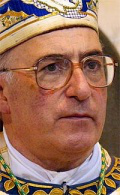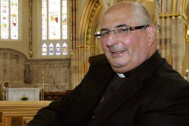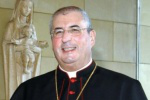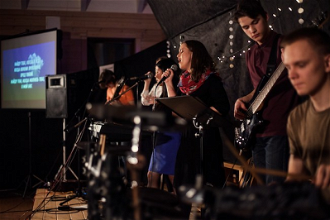Glasgow: Archbishop Conti voices opposition to assisted suicide bill

Archbishop Conti
The Archbishop of Glasgow, the Most Reverend Mario Conti, has hit out against Margo MacDonald’s End of Life Assistance Bill by saying it is “wrong in principle” and that “hard cases made bad laws.”
The head of Scotland’s most populous diocese made clear his opposition by stating that “it is wrong in principle for someone to take their own life” and “it is wrong in principle for someone to help them to do so.”
Speaking during the annual ‘Mass for Health Care Workers’ Archbishop Conti went on to emphasise that “attempted suicide is no longer a criminal offence” but that laws against “assisted suicide should remain…the good of society demands that it be not changed. Mercy can be shown in the administration of justice.”
The 'Mass for Health Care Workers' was held at the Parish Church of Our Lady of Lourdes, Cardonald, yesterday.
Here follows the text of the Archbishop’s sermon, which commenced with a reference to the Gospel read at the Mass, taken from Saint Luke’s Gospel, Chapter 6 verses 17, 20-26).
“Jesus came down with the twelve” (Lk 6, 17). He came down from the hills where he had gone to pray all night, and “When it was day he called his disciples and chose from them twelve, whom he named apostles”. (Ibid 6, 12-16). Accompanied by these twelve he addressed “a great multitude of people” who had joined his disciples. They “had come to hear him and be cured of their diseases…and all the crowd sought to touch him for power came forth from him and healed them all”.
This last verse was omitted in the passage we read, but it is relevant to our celebration today, for we have gathered to mark the 18th World Day of the Sick, which is also the 25th Anniversary of the Pontifical Council for Health Care Workers. Our Mass – the third such – is following the lead given us by the Holy See; on Thursday, the Feast of Our Lady of Lourdes, the Holy Father celebrated Mass in Saint Peter’s Basilica. In announcing it he said it constituted “A further reason – opportunity – to thank God for the journey – the progress – that has been made hitherto on this sector of the Church’s pastoral care. I hope”, he said, “that it will be an occasion for a more generous apostolic impetus in the service of the sick and of those who care for them”.
The bishops in celebrating this Mass echo the Holy Father’s intentions. In a particular way we want to honour all the members of the Church who devote themselves to the care of the sick and who are variously represented here today, especially the members of our respective Lourdes Hospitalities: nurses, doctors, lady helpers, brancardiers and our devoted hospital chaplains and auxiliary ministers of Holy Communion and hospital visitors – to pray with them and for them.
The Order of St John of Jerusalem, better known as the Order of Malta – the oldest religious body dedicated to the care of the sick, has twin purposes in its constitution: “Tuitio Fidei” – the defence of the Faith, and “Obsequium Pauperum”, meaning a service of the poor which goes beyond duty. The poor in this case are “Our Lord’s the sick”.
Jesus announced His own mission by reference to the words of the prophet Isaiah: “The Spirit of the Lord is upon me, because he has anointed me to preach good news to the poor” (Lk 4, 18). In today’s Gospel Our Lord addresses “his disciples”: “How happy are you who are poor; yours is the Kingdom of Heaven…happy you who weep now; you shall laugh…”. Given the context it is easy to relate these words to the curing of their diseases. Undoubtedly they have a wider application, namely God’s “preferential option” – in today’s expression of Catholic social teaching – of the poor, - what a biblical commentator on this passage calls “God’s prejudicial commitment to the poor”. He added: “The coming of the kingdom will bring a reversal of fortunes”. Saint Luke in his Gospel makes it clear that one of the principal hallmarks of the kingdom will be the redemption of the poor – and here the evangelist portrays Jesus as teaching His disciples to do likewise – to do what He has done, i.e. to cure them of their diseases.
The Holy Father in his message recalls how “Jesus at the Last Supper, before returning to the Father, bent down to wash the feet of the Apostles, anticipating His supreme act of love on the Cross. By this gesture, He invited His disciples to enter into – what the Holy Father called – the same ‘logic of love’ by bending down to tend the wounds of the body and spirit of so many of our brothers and sisters whom we encounter – like the good Samaritan – on the roads of the world”. “And I would like to add,” he said, - and I paraphrase his words: that more than ever today we need to be alongside, and be seen by society to be alongside, the sick, demonstrating our care for them at every stage “from conception until their natural life’s end” – the most effective way indeed of defending life.
The motive can only be love. Two apparently similar indictments were given wide cover in the press recently: Two mothers were accused of helping their children to die; one was given a long prison sentence; the other found not guilty of murder, the charge under which both were arraigned (- if I am not mistaken) – two judgments at variance. One mother was acquitted on the basis of her sustained love of her daughter whom she did not wish to see die, though she ultimately assisted her in so doing. That may seem a judgment on the other mother, - whether fairly or not I don’t know.
There is room for compassion in the administration of justice – but it is truly said “that hard cases make bad laws” – and for that reason I am opposed to Margo MacDonald’s End of Life Assistance Bill. Courts can take mitigating circumstances and motives into account. Laws need to be objective in their statement of principle. It is wrong in principle for someone to take their own life; it is wrong in principle for someone to help them to do so. Attempted suicide is no longer a criminal offence; assisted suicide should remain one; the law should not be changed – the good of society demands that it be not changed. Mercy can be shown in the administration of justice.
Mercy, compassion, love – these are all aspects of genuine humanity; they are essential virtues of Christ’s disciples. They come into play when we serve the sick.
In conclusion I want to quote some words which I noticed in the Lesson of yesterday’s Divine Office, drawn from an ancient author, Blessed Isaac of Stella: “Brothers (and Sisters) why do we pay so little heed to seeking out opportunities to save each other, so that the greater we see the others’ needs to be, the more we come to their help? This is what the blessed apostle (Paul) said: ‘Bear one another’s burdens, and so fulfil the law of Christ’; and in another place he speaks of ‘forbearing one another in love’, for that, indeed is the law of Christ…that truly is the law of Christ who, surely ‘has borne our griefs’ in His passion and ‘carried our sorrows’ in His compassion, loving those whom he carried and carrying those whom he loved…
Therefore, in our compassion for each other let us too be lovers of our brothers (and sisters), because of each other’s weaknesses, and persecutors of vice…for that is the love on account of which everything should come into being or cease to be, should be changed or left unchanged. That love is the source of all things and the final end towards which everything should be fittingly directed. Nor can anything be blameworthy that is done in truth on account of that love and in accordance with it.”
“May it be His will to grant us that love, whom we cannot please without it, without whom we can do nothing at all, He who lives and reigns, God, through endless ages. Amen.”





















